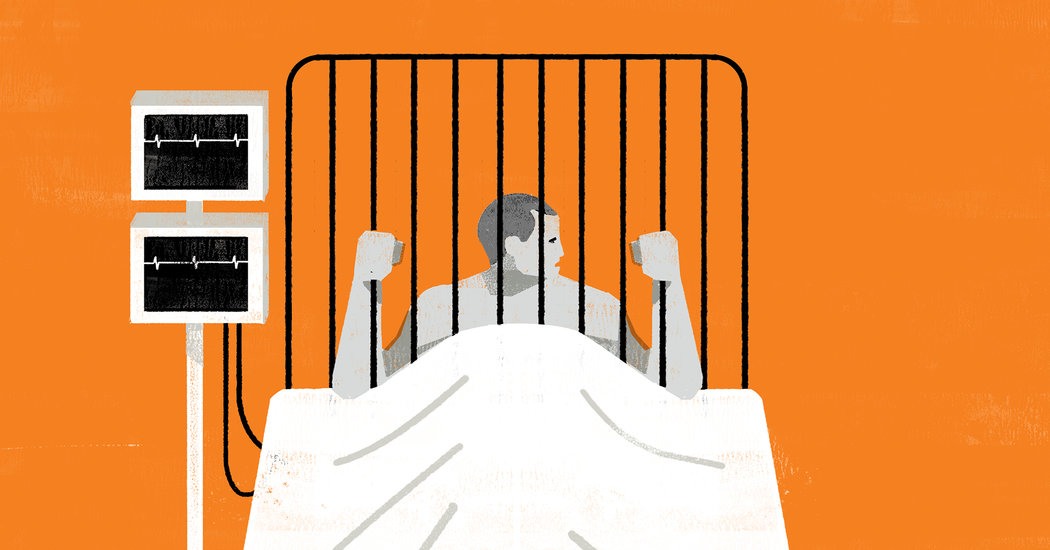For those who don’t wish to sit by helplessly during the coronavirus crisis, there is something you can do. You can very possibly save a life by bailing someone out of jail.
A human catastrophe is unfolding inside America’s houses of detention. As the virus continues its spread, 2.3 million prisoners and 400,000 corrections officers (not to mention their families) are living and working cheek by jowl, vulnerable to this highly contagious scourge, poorly supplied with protective gear and unable to practice social distancing. The surge in infections is most likely just beginning.
“The spread inside jails is going to be quick and massive, particularly in areas with limited access to health care facilities from Louisiana to California to New York,” said Pilar Weiss, director and founder of the National Bail Fund Network, an umbrella organization that allocates money to local bail funds around the country. “We are literally creating tinder boxes of death.”
Around the country, scores of local bail funds and community-based organizations are frantically trying to raise money to secure the release of people in jail and immigration detention centers. These people have not been convicted of a crime and are typically incarcerated while they await trial, too poor to post the bail or bond to secure their temporary release. People released after an arrest overwhelmingly come back to court, according to recent figures from the New York City Criminal Justice Agency. Eighty-six percent showed up on their scheduled court date and, when adjusted to give people a month to voluntarily clear up their missed court date, fully 93 percent appeared.
Two national bail organizations, the Bail Project and the National Bail Fund Network, direct millions of dollars annually toward paying bail. They are now positioned to move thousands of vulnerable people out of harm’s way from the coronavirus. They are nonprofit organizations, and contributions are tax deductible.
As The Marshall Project’s Joe Neff and Anna Flagg recently wrote in The New York Times, local jails — where people not convicted of a crime await their court date — are fertile breeding grounds for disease. Over 200,000 people flow into and out of local jails every week, where they are fingerprinted, escorted by corrections officers and visited by their families. “The churn of people moving in and out threatens to accelerate the spread of the disease, endangering the incarcerated, the staff and the larger community,” they wrote.
Historically, the argument for outsiders providing bail for people awaiting trial has been straightforward: It’s a matter of justice. Over 670,000 people sit in our jails and immigrant detention centers, accused but not convicted of a crime, often for long stretches, waiting for their trial or hearing. In one notable case last year, a transgender woman, Layleen Polanco, died while in restrictive housing at Rikers Island in New York City after being incarcerated for nearly two months. City officials determined that her death was caused by complications from epilepsy. She was unable to come up with $500 bail following a misdemeanor assault charge.
Now, with the number of Covid-19 cases mounting among the incarcerated and corrections officers around the country, what began as a criminal justice initiative has become a public health imperative. From the beginning of the pandemic, advocates for the imprisoned have worked to persuade governors, judges and prosecutors to get them out of harm’s way by granting early release. According to the Vera Institute of Justice, jurisdictions such as Westchester County in New York; Marion, Ind.; and Wayne, Mich., have recently reduced their jail populations by roughly 30 percent. But these jurisdictions represent exceptions to the national trend, not the rule.
“We’re hearing from a lot of public defenders offices saying we’ve been fighting, we’ve asked the governor, we’ve asked the mayor, we need more money to get people out ourselves,” said Ms. Weiss of the National Bail Fund Network.
This is where the bail funds come in, since they are the fastest way to get the incarcerated out of jail. “In most major cities, a couple million dollars can get hundreds of people out of jail,” said Insha Rahman, the director of strategy for the Vera Institute. “For example, $5 million right now would empty Rikers Island of almost 400 people jailed pretrial on bail they can’t afford.”
There is, of course, something perverse about private citizens bailing out strangers so that they don’t get infected by a deadly virus. In a world where we valued the humanity of our prisoners and guards, our elected officials would move mountains to protect the public by removing vulnerable populations from high-risk environments such as jails.
Sadly, that is not the country we live in. If you want to save a life, you cannot rely on a enlightened criminal justice system to do the work. If you can afford it, bail someone out now.
Neil Barsky is the chairman and founder of The Marshall Project, a nonprofit journalism organization covering the U.S. criminal justice system.
The Times is committed to publishing a diversity of letters to the editor. We’d like to hear what you think about this or any of our articles. Here are some tips. And here’s our email: [email protected].
Follow The New York Times Opinion section on Facebook, Twitter (@NYTopinion) and Instagram.



















